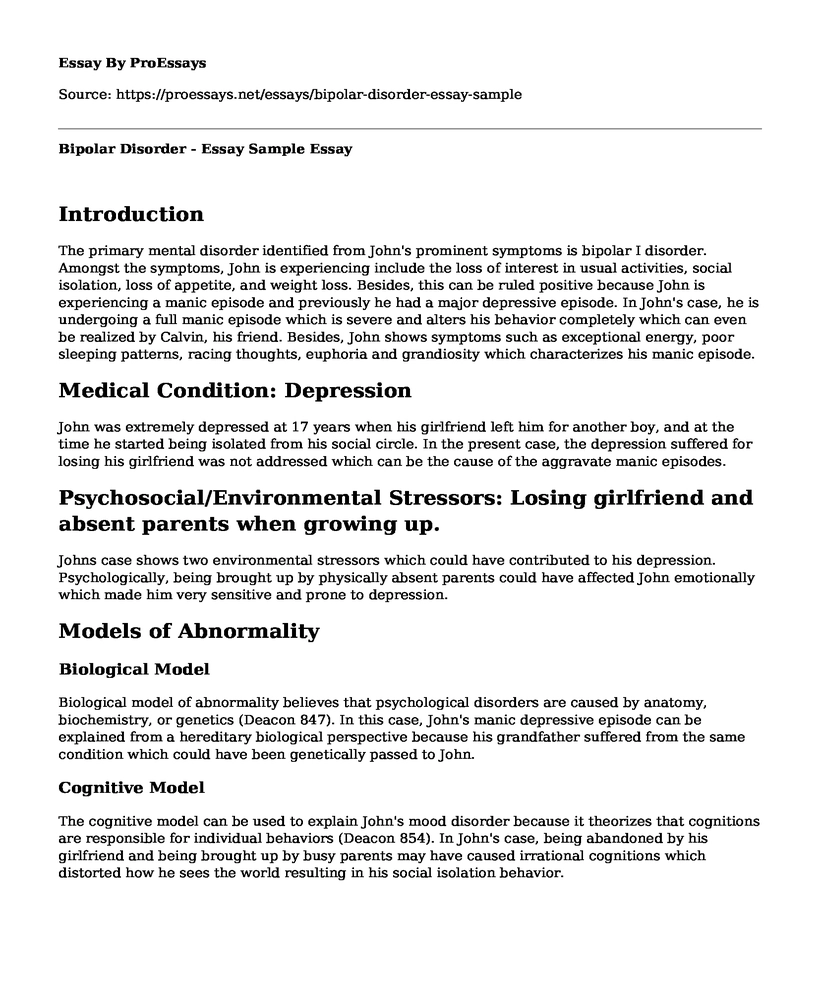Introduction
The primary mental disorder identified from John's prominent symptoms is bipolar I disorder. Amongst the symptoms, John is experiencing include the loss of interest in usual activities, social isolation, loss of appetite, and weight loss. Besides, this can be ruled positive because John is experiencing a manic episode and previously he had a major depressive episode. In John's case, he is undergoing a full manic episode which is severe and alters his behavior completely which can even be realized by Calvin, his friend. Besides, John shows symptoms such as exceptional energy, poor sleeping patterns, racing thoughts, euphoria and grandiosity which characterizes his manic episode.
Medical Condition: Depression
John was extremely depressed at 17 years when his girlfriend left him for another boy, and at the time he started being isolated from his social circle. In the present case, the depression suffered for losing his girlfriend was not addressed which can be the cause of the aggravate manic episodes.
Psychosocial/Environmental Stressors: Losing girlfriend and absent parents when growing up.
Johns case shows two environmental stressors which could have contributed to his depression. Psychologically, being brought up by physically absent parents could have affected John emotionally which made him very sensitive and prone to depression.
Models of Abnormality
Biological Model
Biological model of abnormality believes that psychological disorders are caused by anatomy, biochemistry, or genetics (Deacon 847). In this case, John's manic depressive episode can be explained from a hereditary biological perspective because his grandfather suffered from the same condition which could have been genetically passed to John.
Cognitive Model
The cognitive model can be used to explain John's mood disorder because it theorizes that cognitions are responsible for individual behaviors (Deacon 854). In John's case, being abandoned by his girlfriend and being brought up by busy parents may have caused irrational cognitions which distorted how he sees the world resulting in his social isolation behavior.
Treatment Recommendation: Ellis Therapy and Mood Stabilizers
John can be treated with a combination of medication and psychotherapy to achieve optimum positive outcomes in behavioral correction. John should be prescribed lithium medication which is an effective mood stabilizer. Lithium works by keeping a constant amount of glutamate a neurotransmitter in the cells at the optimum level (Malhi, McAulay, and Fritz 295). In most cases, glutamate is involved in manic episodes due to its variations and prescribing lithium will help to put John's manic episodes in control.
Ellis' Rational Emotive Behaviour Therapy will be an effective treatment option for John in a combination of Lithium because of its ability to create coping skills to reduce stress. The therapy treatment is informed by an ABC model that involves an event that creates beliefs and leads to emotional based consequences (Phillips 4). In the case of John, being left by his girlfriend and busy parents could have resulted in a negative emotional response which contributed to manic depressive episodes. As such, Ellis' Rational Emotive Behaviour Therapy identifies the underlying irrational thoughts and feelings and help John to be able to challenge the irrational thoughts with positive beliefs by employing cognitive strategies which focuses on emotions and beliefs and can be able to help John to adopt coping behavior and minimize stressors.
Ethical Concerns
The potential ethical concerns, in this case, can be the side effects of lithium as a mood stabilizer which can cause low thyroid function, indigestion and joint pain (Malhi, McAulay, and Fritz 299). On the other hand, Ellis' Rational Emotive Behaviour Therapy requires the patient to face their irrational thoughts which could be daunting for John because the treatment approach requires the therapist to disclose the irrational beliefs and opinions that the patient might hold (Phillips 2).
Works Cited
Deacon, B, J. "The biomedical model of mental disorder: A critical analysis of its validity, utility, and effects on psychotherapy research." Clinical psychology review 33.7 (2013): 846-861.
Malhi, G, S., McAulay, C, and Fritz, K. "Current status of lithium in the treatment of mood disorders." Current Treatment Options in Psychiatry 1.3 (2014): 294-305.
Phillips, Lucy C. "Christian Rational Emotive Behavior Therapy." Fidei et Veritatis: The Liberty University Journal of Graduate Research 1.2 (2016): 4.
Cite this page
Bipolar Disorder - Essay Sample. (2022, Dec 07). Retrieved from https://proessays.net/essays/bipolar-disorder-essay-sample
If you are the original author of this essay and no longer wish to have it published on the ProEssays website, please click below to request its removal:
- Meditation and Consciousness Research Paper
- 13 Reasons Why Critical Essay
- Classical Conditioning in Psychology Paper Example
- Research Paper on What is Cushing's Syndrome?
- Paper Example: My SWOT Analysis & Personal Development Plan
- Essay Example on Creativity: Thinking Beyond the Obvious
- Essay on Origins of Eating Disorders: Fueled by Western Media







